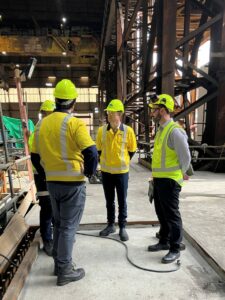Cutting red tape to encourage productivity
 A visit to Glenbrook Steel Mill
A visit to Glenbrook Steel Mill
By Chris Penk, Minister for Small Business and Manufacturing
Among the many things I’ve come to appreciate in this job is just how challenging it can be to run a small business in New Zealand’s regulatory maze – no matter the industry.
In the wise words of our Prime Minister, “we can have more growth, more exports, more jobs, and higher wages for every New Zealander – we just have to say yes to letting it happen.”
It’s clear to me that, like so many other businesses, manufacturers want to spend more time making things and creating jobs, and far less time buried in paperwork.
Too often businesses tell me unclear or outdated regulations stand in the way. For example, machine guarding rules can clash with food safety standards, or exposure limits might fail to reflect the real risks on the ground.
Many manufacturers have faced the frustrating reality that rigid rules cost time, money and productivity – without always delivering better safety outcomes.
That’s why this Government is pushing ahead with work to clear out the sticky red tape that gums up the works.
I want to acknowledge my colleague, Workplace Relations and Safety Minister Brooke van Velden, who has spent recent months engaging with manufacturers across the country.
From sawmills to commercial bakeries, businesses have been upfront with Minister van Velden, as they have been with me, about the frustration of navigating grey areas and impractical requirements that tie them in knots.
One example that stands out came from a business owner who shared how identical machine guarding passed inspection by WorkSafe in Auckland yet failed in Christchurch.
When the same piece of equipment is treated differently depending on who shows up on site, it’s obvious something needs to change.
We’re taking that feedback seriously. Outdated machine guarding rules are being simplified to keep workers safe without piling on endless compliance costs.
Workplace exposure standards are also under review for things like softwood dust, hardwood dust, welding fumes and flour dust. These rules must protect workers’ health and be practical, measurable and aligned with how modern businesses operate.
It was a submission from commercial bakers, shared through the Government’s Red Tape Tipline, which sparked WorkSafe’s move to review the Workplace Exposure Standard for flour dust. Bakers warned that the current limit is so strict it risks shutting down businesses altogether. One bakery spent millions retrofitting air conditioning, buying new industrial vacuums, and ramping up deep cleaning – yet still found it almost impossible to comply.
Costs like these flow through the entire supply chain and push up prices at the checkout. At a time when some families feel the pinch just buying a loaf of bread, that’s simply unacceptable.
Our goal is to get these settings right so businesses can trust they’re working to clear, sensible rules – without second-guessing inspectors or shelling out for endless workarounds. This is part of a wider effort to bring back New Zealand’s practical, can-do spirit.
When businesses have certainty, they’re more likely to invest, grow their teams and deliver better products at better prices.
The online tipline gives every Kiwi a way to shine a light on pointless, confusing or outdated rules. We want to hear from manufacturers about the other regulatory headaches slowing them down.
If you’re reading this and have an example, I encourage you to jump online and share it.
New Zealand manufacturers already do extraordinary things every day. Our job is to back them – not bind them up in barriers. By putting common sense at the heart of the rules, we hope to help local businesses keep Kiwis in good jobs for years to come.



